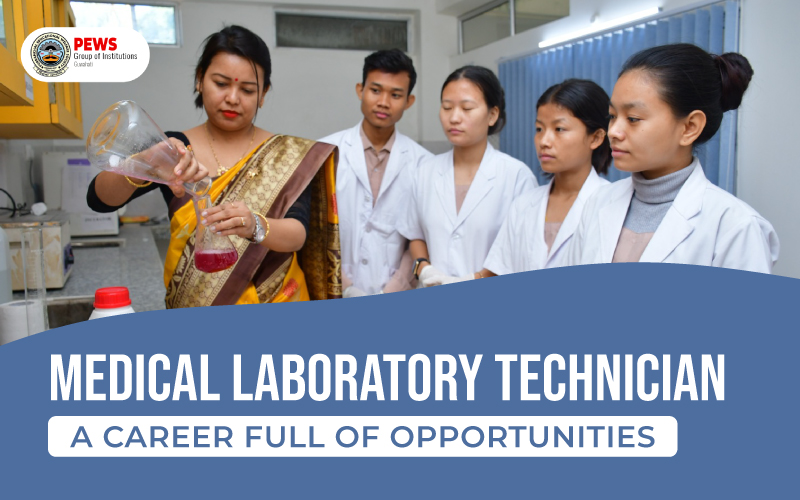
The healthcare sector is an ever-growing industry that requires a diverse set of professionals to keep up with the demands of the public. While people are more familiar with common medical professions, there are also lesser-known positions worthy of consideration. One such option is a Medical Laboratory Technician (MLT). This career path requires specific qualifications and entails the scientific and technological components of medicine. With the right skills and drive, pursuing an MLT career can be rewarding and possibly lucrative.
What is a Medical Laboratory Technician?
An individual who uses laboratory equipment, procedures, and tests to assess the health of human tissues and blood samples is known as a Medical Laboratory Technician, sometimes known as a Clinical Laboratory Technician. Medical experts, lab technicians, and lab managers work with them in a variety of clinical, diagnostic, or hospital laboratories. They are in charge of gathering information that helps with disease diagnosis and treatment; therefore, their function in the healthcare industry is crucial.
How do I pursue a Medical Laboratory Technician career?
Bachelor's program:
There are several specializations available for those who want to pursue a career in medical laboratory technology. A choice in this category is the Bachelor of Science in Medical Laboratory Technology and BSc in Medical Laboratory Technology (Lateral Entry). To compile information about a patient's health, this curriculum, which is a healthcare-related course, uses a great deal of clinical samples. Students will gain knowledge on a wide range of medical science subjects, such as the anatomy and physiology of the human body. The role of the immune system in preserving human health and fending off disease is discussed in the course, along with various strains of bacteria, viruses, parasites, and fungi.
Career Opportunities:
Graduates of this program can explore numerous career opportunities. They can work as lab technicians or lab managers, become clinical instructors or tutors, academic coordinators, or even lab attendants. For those keen on furthering their studies, they can acquire higher positions such as assistant professor, professor, or research scientist.
Eligibility:
A person who earned 50% on the 10+2 exam in Physics, Chemistry, Biology, or Physics, Chemistry, and Mathematics from any reputable board or institution is eligible for a BSc in MLT.
To be eligible to apply for the Bachelor of Science in Medical Laboratory Technology (Lateral Entry), candidates must hold a DMLT with 50% scores.
Master's Programme:
The two-year Masters of Medical Laboratory Technology (MMLT) program is another respectable option.
Career opportunities:
After completing this program, students can pursue careers as laboratory technicians in several important positions that are limited to UG and diploma graduates. They will also have access to advanced training and educational facilities that can help them fine-tune their skills and further their career progression.
Eligibility:
A Bachelor of Medical Laboratory Technology (BMLT), a Bachelor of Science in Medical Laboratory Technology (MLT), a Bachelor of Science with Honours in Microbiology, Biochemistry, or Biotechnology, or a Bachelor of Science with Honours in any branch of Biological Science and a Diploma in Medical Laboratory Technology (DMLT) from a recognized university is required for enrollment in this program.
Diploma programme:
The Diploma in Medical Laboratory Technology (DMLT) is an additional option for people who want to work in this industry. This study is a two-year diploma degree that emphasizes the development of skills in illness prevention, diagnosis, and treatment using clinical lab testing.
Career opportunities:
Candidates for the DMLT course can choose from several specializations, including microbiology, clinical chemistry, clinical biochemistry, radiography, genetics, and more.
Graduates can explore numerous career opportunities, such as Operation Theatre (OT) Techniques, Community Health Nursing, Psychiatric Nursing, Leprosy Nursing, TB Nursing, Neurological and Neurosurgical Nursing, Cancer Nursing, Orthopaedic Nursing, and more.
Eligibility:
To be eligible for the DMLT course, candidates must have passed their (10+2) Science with PCB with a minimum of 45% marks and 40% marks for SC/ST/OBC/MOBC.
To sum up, the medical industry relies heavily on the Medical Laboratory Technician career route. For individuals considering a career in this industry, it offers a considerable opportunity. These programs provide students who desire to advance the healthcare business with specialized education and training. There are several employment options available, whether they are obtained through a Bachelor of Science in Medical Laboratory Technology (Lateral Entry), a Master of Medical Laboratory Technology (MMLT), or a Diploma in Medical Laboratory Technology (DMLT). One can have a rewarding career in this field with the appropriate training, commitment, and abilities, and by offering the general public important healthcare services, one can support the expansion of the healthcare industry.